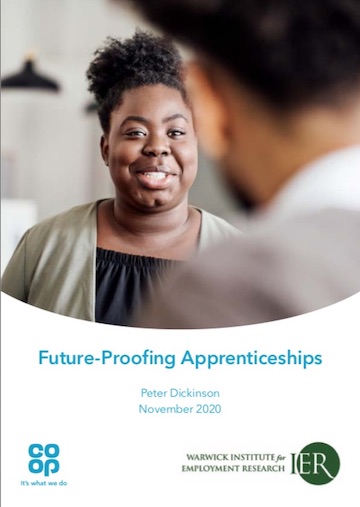Future-proofing apprenticeships - report launched today
 A report into the national apprenticeships programme commissioned by the Co-op group from the University of Warwick's Institute for Employment Research is being launched this morning at a round-table chaired by Co-op CEO, Steve Murrells.
A report into the national apprenticeships programme commissioned by the Co-op group from the University of Warwick's Institute for Employment Research is being launched this morning at a round-table chaired by Co-op CEO, Steve Murrells.
Mr Murrells will open the discussion on Thursday 26 November. Taking part will be representatives from the Department for Education, the National Apprenticeship Service, the National Society of Apprentices and the Chartered Institute of Personnel and Development.
The conversation will focus on a brand new report, commissioned by the Co-op group, into the national apprenticeships programme.
The report, prepared by the University of Warwick’s Institute for Employment Research (IER), considers the many differences between apprenticeships across sectors and employers, despite the standardised routes to government funding, and makes recommendations on change to government policy.
It analyses programmes across the food retail and funeral sectors to understand how businesses can take different approaches to recruitment, training and operations as they face into their own sector’s challenges. The report includes interviews with business leaders, the British Retail Consortium and the National Association of Funeral Directors.
Commenting on the report, Peter Dickinson, Senior Research Fellow at Warwick’s Institute for Employment Research, and the report's author, said:
“Of those we spoke to, there is widespread need for apprenticeships to evolve, so that more opportunities can be delivered. The levy doesn’t currently cover the training some young people need just to qualify for an apprenticeship, or the additional training that can futureproof a young person’s career, like key digital skills, despite the fact this training is becoming increasingly important. As employers cover these costs, the number of apprentices they can afford reduces.
“Also, we identified that small and medium enterprises are taking on fewer apprentices. It was originally 50% in 2018, but dropped to 43% last year. There needs to be some sort of levelling, so that all businesses of any size can create important opportunities for young people.”
The study found that, across businesses:
- Compared to the funeral sector, food retail colleagues are more likely to be female, older and work part-time, based in smaller businesses.
- There are far more apprentices in the retail sector (10,885) than the funeral sector (782). However, the number of retail apprentices has fallen by about a quarter since 2014/15 whereas funeral sector apprentices have doubled over the same period.
- Almost nine out of ten funeral sector apprenticeships were at Intermediate level compared to 59% in retail. Around one in five retail apprenticeships are higher level (Level 4+).
- The funeral sector and food retail sector alike are seeing job roles broaden. In the funeral sector, there is increased workforce flexibility, and digital technology is impacting. Part-time and temporary working is likely to continue to rise; staff are undertaking a wider range of job functions; digitisation of organisational processes, customer communication and remote access funerals are likely to increase.
Steve Murrells said: “Currently, we offer 1,200 apprenticeships across the Co-op. These colleagues are based across our group, from our support centre in Manchester right through to the frontline in UK high streets, in our food stores and funeral homes. I’ve seen how their energy and new ways of thinking helps us to achieve a better way of doing business.
“Giving people the opportunity to make their mark through an apprenticeship can drive social mobility and help tackle the persistent inequalities in our society. That’s why I champion apprenticeships and also why we want to work with the government, following this report to future-proof the apprenticeship policy. We want to help address how the national programme can better accommodate different needs, business to business, apprentice to apprentice.”
One aspect of the national apprenticeship programme most likely to come under discussion as part of the round table is the government’s long-standing ‘Apprenticeship Levy.’ Businesses with an annual wage bill of more than £3m are currently required to contribute, with the opportunity to utilise these same funds to spend towards training their own apprentices. As it stands, the Levy covers the required direct training and assessment for each apprenticeship, but not all aspects, such as the mandated 20% off the job training.
Murrells said: “The levy helps ensure apprenticeships are prioritised by businesses in England, creating opportunities for individuals and communities to enable social mobility in a sustainable way. This study shows us that companies in these two sectors alone have very different approaches, working with different apprentices with different needs – a ‘one-size-fits-all’ approach just won’t work.
“As the pandemic continues and need for flexibility increases, the levy is holding employers back, of all sizes, from being able to increase the number of apprenticeships they can create at this critical time.
“We could offer hundreds more apprenticeships, particularly in those parts of the country hardest hit by the pandemic, following some simple changes to the current policy framework.”
26 November 2020
